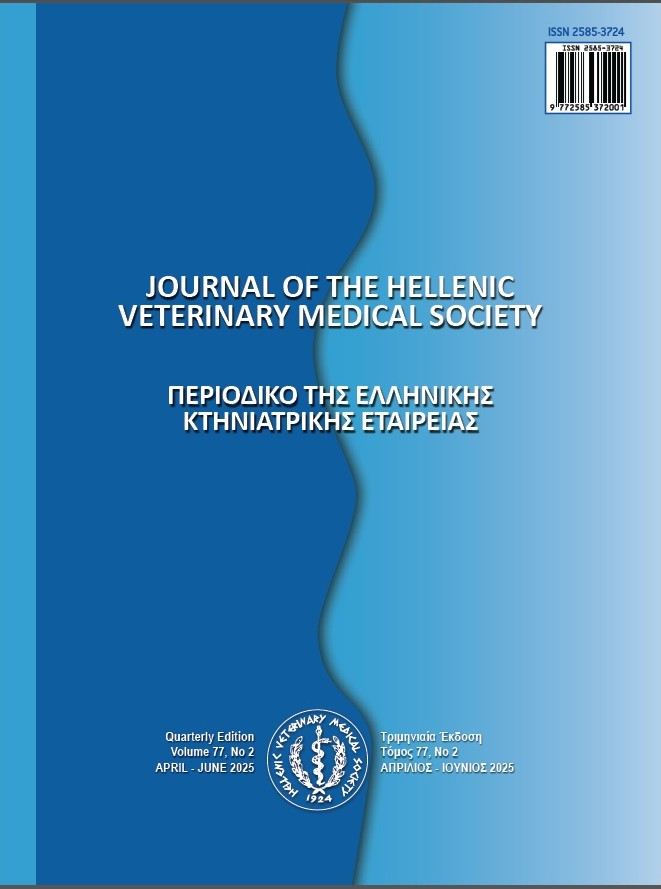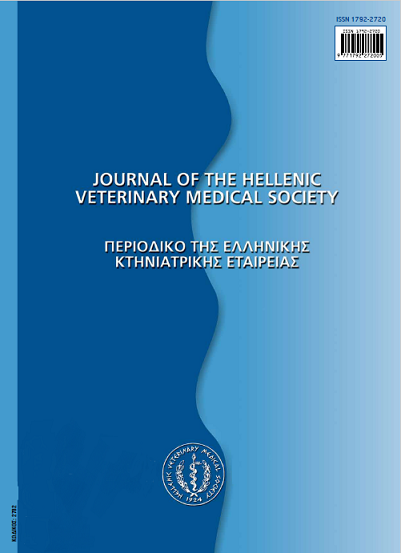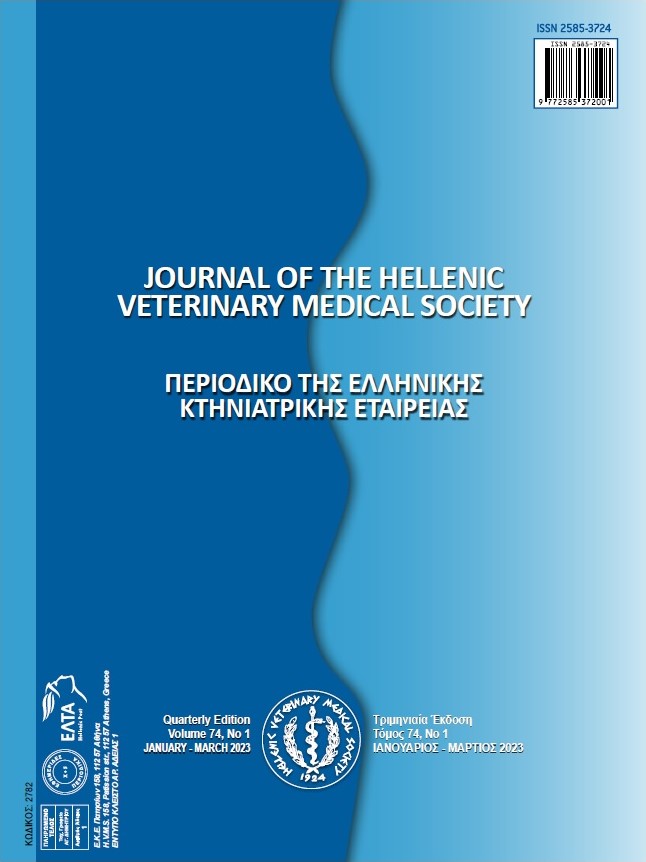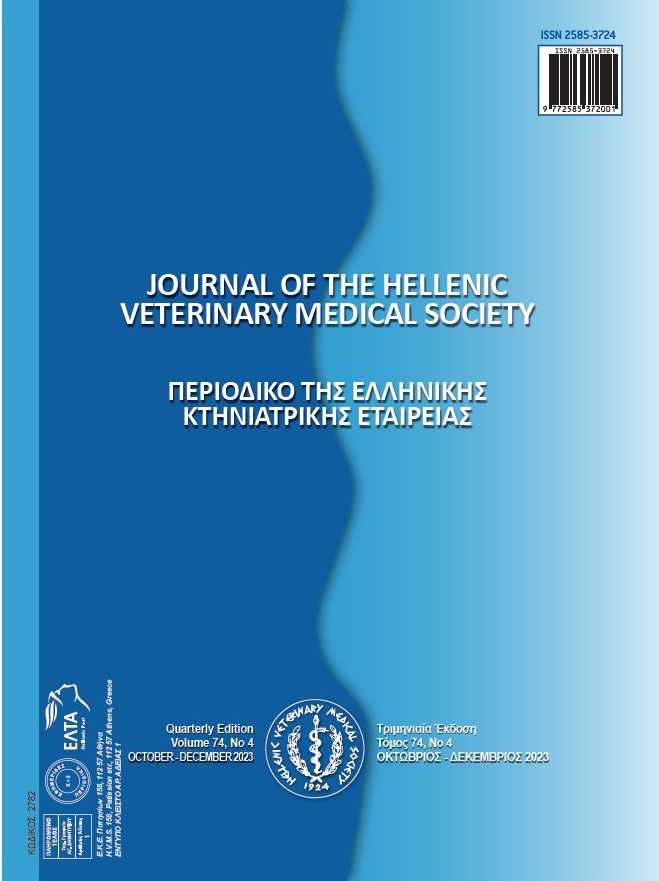Effect of water-based nutritional supplement on growth performance, carcass characteristics, serum biochemistry, and immunological response of broiler chicken
Περίληψη
Broiler lines are currently rigorously selected for faster growth and greater final body weight. Nutrition has a critical role in maintaining broiler body growth. This study aimed to determine how water-based nutritional supplements affected broiler chickens' growth performance, carcass characteristics, serum biochemistry, and immunological response. A total of 200 newly hatched unsexed broiler chicks (Cobb-500) were divided into four treatment groups (T1, T2, T3, and T4), replicated five times with ten birds in each, under a completely randomized design. Different concentrations of the supplement, 0% (T1), 2.5% (T2), 5% (T3), and 7.5% (T4), were added to the water. Growth performance, carcass characteristics, serum biochemical profile, and immune antibody response parameters were evaluated for a span of 35 days. The findings demonstrated that body weight gain and feed efficiency significantly improved in the birds provided nutritional supplements at 5 and 7.5% than in the 2.5% and control group (T1). The 5% and 7.5% nutritional supplement groups displayed lower mortality rates compared to other two groups. However, feed consumption did not significantly differ between treatments. The birds fed nutritional supplement at 5 and 7.5% showed enhanced (P<0.05) carcass yield than other groups whereas all other metrics, such as breast yield, thigh yield, wing weight, liver weight, heart weight, gizzard weight, and abdominal fat weight, were not significantly different (P>0.05) between treatments. There were no differences in albumin, total protein, globulin, cholesterol, uric acid, triglycerides, or glucose levels in serum between the various treatments. In comparison to the other groups, the birds administered nutritional supplements at 5% and 7.5% had higher immune antibody titers against the Newcastle disease and infectious bronchitis vaccinations. In conclusion, adding 5% of a nutritional supplement to the water may improve broiler overall performance while being more cost-effective.
Λεπτομέρειες άρθρου
- Πώς να δημιουργήσετε Αναφορές
-
Khan, M., Afzal, Z., Arslan, M., Asad, T., Nisa, Q., Akhtar, R., Siddique, B., Nazir, S., Farooq, Z., Wadood, F., Younas, U., Salam, M., Khaliq, H., & Arshad, M. (2025). Effect of water-based nutritional supplement on growth performance, carcass characteristics, serum biochemistry, and immunological response of broiler chicken. Περιοδικό της Ελληνικής Κτηνιατρικής Εταιρείας, 76(2), 9209–9216. https://doi.org/10.12681/jhvms.38657
- Τεύχος
- Τόμ. 76 Αρ. 2 (2025)
- Ενότητα
- Research Articles

Αυτή η εργασία είναι αδειοδοτημένη υπό το CC Αναφορά Δημιουργού – Μη Εμπορική Χρήση 4.0.
Οι συγγραφείς των άρθρων που δημοσιεύονται στο περιοδικό διατηρούν τα δικαιώματα πνευματικής ιδιοκτησίας επί των άρθρων τους, δίνοντας στο περιοδικό το δικαίωμα της πρώτης δημοσίευσης.
Άρθρα που δημοσιεύονται στο περιοδικό διατίθενται με άδεια Creative Commons 4.0 Non Commercial και σύμφωνα με την άδεια μπορούν να χρησιμοποιούνται ελεύθερα, με αναφορά στο/στη συγγραφέα και στην πρώτη δημοσίευση για μη κερδοσκοπικούς σκοπούς.
Οι συγγραφείς μπορούν να καταθέσουν το άρθρο σε ιδρυματικό ή άλλο αποθετήριο ή/και να το δημοσιεύσουν σε άλλη έκδοση, με υποχρεωτική την αναφορά πρώτης δημοσίευσης στο J Hellenic Vet Med Soc
Οι συγγραφείς ενθαρρύνονται να καταθέσουν σε αποθετήριο ή να δημοσιεύσουν την εργασία τους στο διαδίκτυο πριν ή κατά τη διαδικασία υποβολής και αξιολόγησής της.






